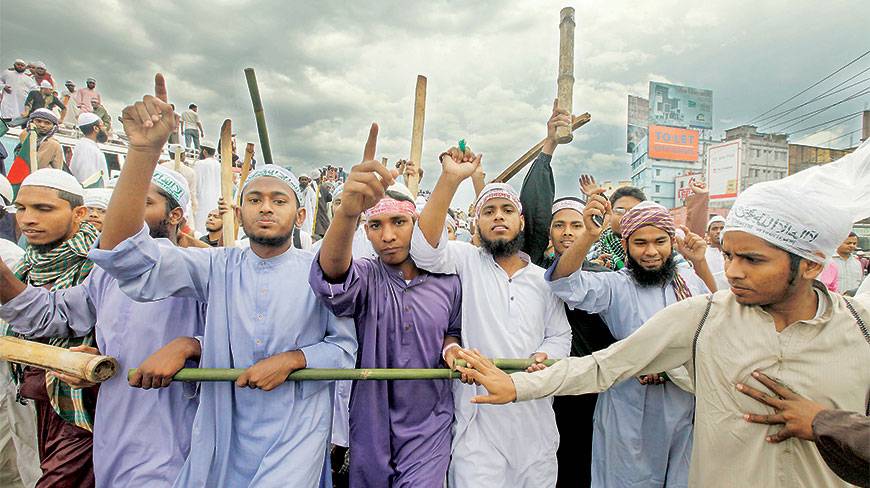Fahmida Zaman
Hefazat’s rise and growth was sudden, but not unforeseen
If you are a politically aware citizen of the world, there are so many issues for you to be concerned about, from IS to Palestine, Kobani to Hong Kong, Obama to Putin. Yet, there is one more that I would like to point out, an issue much closer to home. Perhaps you were apprehensive once, yet have forgotten all about it.
The rise of Hefazat-e-Islam last year shocked you, me, and the moderate middle class Muslims of Bangladesh, as this previously little-known organisation threatened to take over Dhaka and turn our country into a medieval Islamic republic. Their 13-point demand included the enactment of an anti-blasphemy law with provision for the death penalty, exemplary punishment for all bloggers and others who “insult Islam,” the cancellation of the country’s women development policy, a ban on erecting sculptures in public places, and a ban on the mixing of men and women in public.
Yes, the issue was quite imperative until another “important” one took over. But this is why I would like you to take this more seriously; the rise of Hefazat has put some of Bangladesh’s unresolved issues right in our faces, each one of them vital. Very few of them have seen any positive changes, if not been made worse.
Firstly, the majority participants of Hefazat’s activists are from madrasas, particularly from a Qawmi madrasa background. According to many scholars, this medium of education is significantly different from the mainstream Bengali and English ones. Moreover, the lack of recognition of their degrees from the state makes it harder for students coming from a Qawmi background to ensure social and economic security.
This results in rejection from better employment opportunities and the state’s negligence towards groups that are already economically marginalised. This disadvantaged education system, and the negligence of the state, may therefore have provided Hefazat with the motivation to express their frustration, anger, and discontent through mobilisation.
Secondly, Hefazat rose to its current position when Bangladesh was suffering from a lack of an institutionalised political system, where the ruling party could manipulate state institutions in line with their interests.
For example, according to a 2013 study, along with the constitution – which has been modified 15 times in 42 years – other institutions also went through extensive distortion and degeneration.
Thirdly, there is the dreadful relationship between our two major political parties, because of which, and a lack of trust between them, the main parties have appeared as elite allies of Islamists. For example, despite AL and BNP acting like enemies, they both need the support of Islamists to secure parliamentary dominance. Moreover, the ruling parties in Bangladesh have usually unleashed violence against the opposition.
For example, consecutive party governments have controlled the administration, the judicial system, and law enforcement agencies with their party loyalists. When in office, both parties have marginalised and harassed the opposition.
Fourthly, there was the manipulation of religion. Religion has been historically manipulated since our very independence, which has incited instability in politics, and has provided Islamist groups with the prospect to emerge as prominent alternatives. They have failed to provide moral leadership, and have left space within the ideological spectrum, paving the way for Hefazat to emerge in the social and political arena. They have provided Islamist groups with significant political opportunities to mobilise, as well as challenge the social and political order.
Finally, we have seen the rise of ultraconservative groups around the world. The recent rise of ultraconservative Islamist groups, particularly in the Middle East and North Africa, has caught the attention of many observers. In countries like Egypt, Tunisia, and Kuwait, ultraconservative groups have gained significant traction and influence.
Following the rise and growth of these ultraconservative groups, Hefazat has been provided with yet another incentive to mobilise people in order to “save Islam” from “anti-Islamic” forces.
Hefazat’s rise and growth was sudden, but not unforeseen. The hostile relationship between our two main political parties had long ago left the ideological spectrum available for Islamist political parties such as Hefazat-e-Islam to take advantage of. As the institutional weaknesses of the state prevail, and gain national and international political opportunities, groups like Hefazat may re-emerge, with even more power.
As a politically aware person, you know that Hefazat is not just a domestic issue for Bangladesh, rather it is a part of the global phenomenon; and unless our political leaders come to their senses, Bangladesh’s weak institutions and acrimonious political culture combined with political opportunities will reinforce the forceful materialisation of alternative ideologies.
Source: Dhaka Tribune

